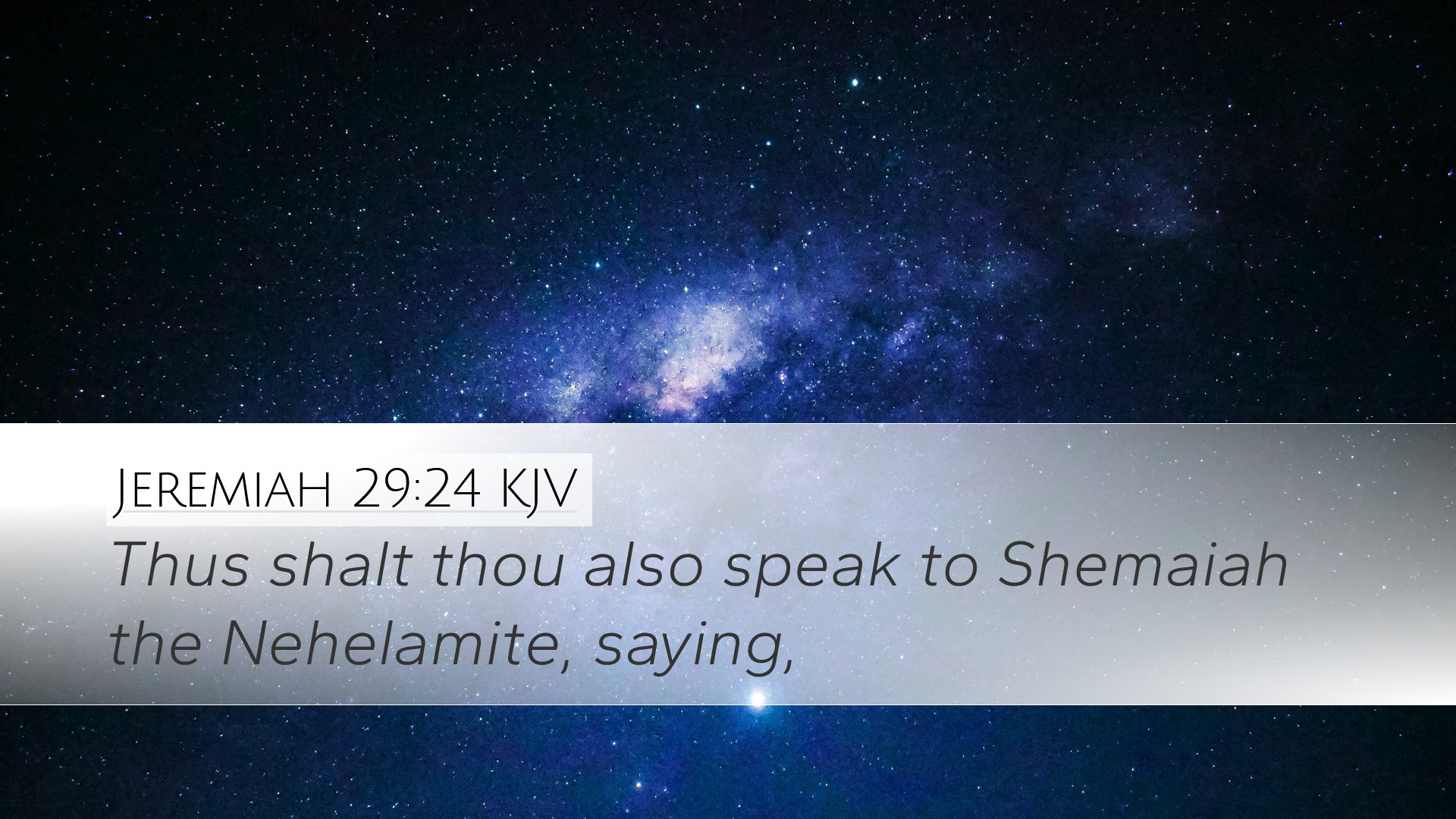Commentary on Jeremiah 29:24
Verse Text: "Thus saith the LORD of hosts, the God of Israel, of Ahab the son of Kolaiah, and of Zedekiah the son of Maaseiah, which prophesy a lie unto you in my name: Behold, I will deliver them into the hand of Nebuchadnezzar king of Babylon; and he shall slay them before your eyes."
Introduction
The Book of Jeremiah, often heralded for its fervent calls toward repentance and its poignant prophetic declarations, serves as an essential text for understanding the dynamics between divine revelation and human behavior in times of crisis. Jeremiah 29:24 addresses the prophets Ahab and Zedekiah, signifying a critical moment of confrontation between true prophecy and falsehood during Judah's exile in Babylon.
Contextual Background
This verse emerges within a letter Jeremiah sends to the exiles in Babylon (Jeremiah 29:1). The chapter discusses themes of hope and restoration but starkly contrasts such optimism with warnings against false prophets who lead the people astray. By scrutinizing the context, scholars can better grasp the gravity of Jeremiah’s message and the particular deception being addressed.
Historical Context
The historical backdrop to Jeremiah 29 is the Babylonian exile, an event that devasted Jerusalem and led to disillusionment amongst the people. False prophets like Ahab son of Kolaiah and Zedekiah son of Maaseiah flourished in this environment, propagating messages that contradicted the troubling reality of exile and God's eventual judgment. This necessitated a divine response, warning Israel of the consequences of heeding false messages.
Commentary Insights
Matthew Henry's Commentary
Henry emphasizes God's sovereignty over false prophets and the inevitability of His judgments. He interprets the references to Ahab and Zedekiah as specific cases that represent a larger pattern of deceit within the prophetic community. Henry underscores that these men prophesied lies in God's name, reflecting a severe breach of trust and integrity. He notes that their ultimate fate, being delivered into Nebuchadnezzar's hand, serves as a grim testament to God's displeasure with falsehood transmitted in His name.
Albert Barnes' Notes
Barnes underscores the importance of discerning true prophecy from falsehood, highlighting that Ahab and Zedekiah represented a legacy of misleading the people. His analysis asserts that the fate of these two prophets illustrates the seriousness with which God regards the truth. He notes that the judgment upon them is not just for their actions but for leading others into error. Barnes indicates that God is unyielding in His judgment; thus, the punishment reflects the gravity of their offense against divine truth.
Adam Clarke's Commentary
Clarke provides a detailed examination of the characters involved, positing their backgrounds and motivations. He elucidates the political and social dynamics that enabled such false prophecies to flourish among the exiled populace. Clarke suggests that these prophets exploited the hopes and fears of people, fostering a false sense of security. He poignantly remarks that God’s rebuke is aimed at restoring truth and faithfulness among His people, highlighting His desire for their ultimate well-being despite their current suffering.
Key Themes
- Divine Sovereignty: God's control over events and entities, including the fate of false prophets.
- Truth vs. Falsehood: The contrast between genuine prophetic guidance and the destructive nature of false prophecies.
- Judgment: The inevitable consequences of leading others away from the truth as a manifestation of God's justice.
- Restoration: The underlying intent of God’s message—a call to return to truthful worship and alignment with His will.
Implications for Modern Readers
This commentary provides essential guidance for modern pastors, students, theologians, and scholars. It encourages vigilance in discerning truth in the midst of competing narratives, a pertinent theme in today's fragmented society. Just as the people of Israel encountered deception during their exile, modern believers are also challenged by messages that may superficially align with scriptural truth but ultimately lead to spiritual danger.
Practical Applications
- Discernment: Emphasizing the necessity of spiritual discernment in evaluating teachings and prophecies.
- Loyalty to Truth: Encouraging a commitment to uphold and propagate biblical truth in ministry.
- Awareness of Consequences: Understanding that falsehood can lead individuals away from God's intended path, with significant ramifications.
- Call to Repentance: An overarching call for both individual and collective repentance and restoration to God.
Conclusion
Jeremiah 29:24 serves as a profound reminder of the weight of words, especially those uttered in God's name. The commentary on this verse invites readers to reflect on the holiness of divine truth and the responsibilities of those who communicate that truth. As we engage with this text, may we aspire to be faithful stewards of God's revelations, embodying integrity in our commitment to His Word.


